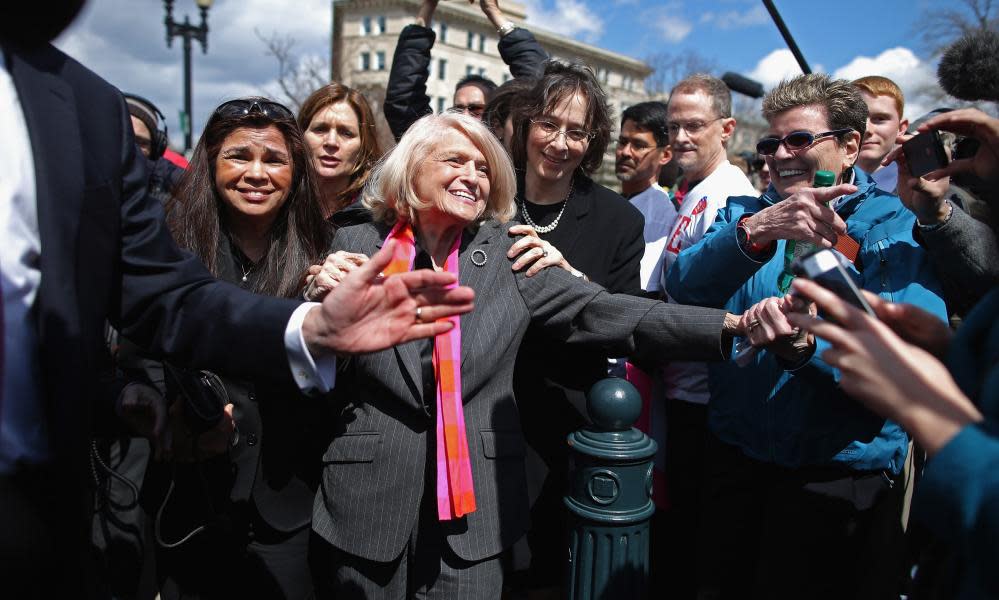Edith Windsor, icon of gay rights movement, dies aged 88

Edith Windsor, the woman who broke barriers and became a gay rights icon when she sued the federal government to recognize her same-sex marriage, died on Tuesday at the age of 88.
Windsor was the lead plaintiff in the 2013 US supreme court case that struck down the Defense of Marriage Act of 1996, giving gay and lesbian couples access to federal benefits and laying the foundation for the landmark decision to legalize same-sex marriage across the country in 2015.
The case was a watershed moment in the history of the United States’ LGBT rights movement.
Doma, as the law was known, prevented countless of same-sex couples across the country from claiming a huge array of federal benefits accessible to heterosexual spouses, and epitomized discrimination in the eyes of the gay rights community.
When Windsor’s lifelong partner died in 2009, the IRS billed her for more than $300,000 in estate taxes she would not have owed had the government recognized their marriage.
Windsor is survived by her second wife, Judith Kasen-Windsor, whom she met in 2015. The couple married last year.
Her path to becoming a hero of the gay rights movement stretches back to 1962, when Windsor was introduced to her first wife-to-be in a Greenwich Village restaurant. They met while dancing. Thea Spyer and Windsor became a lifelong couple, and in 1967, Spyer proposed.
“It was a love affair that just kept on and on and on,” Windsor recalled to the Guardian US in 2013. “It really was. Something like three weeks before Thea died she said: ‘Jesus we’re still in love, aren’t we.’”
For more than forty years, the couple lived together in Manhattan and on Long Island. Windsor, who held a master’s degree in mathematics, rose to the top ranks of IBM. The couple marched as part of the gay rights demonstrations unleashed by the Stonewall Riots of 1969, and whenever they got the chance, they went dancing. After 1977, when Spyer was diagnosed with multiple sclerosis, she led with her good leg, Windsor told the Guardian.
But the couple could not marry in New York during Spyer’s lifetime. In 2007, the couple flew to Toronto, Canada, for a ceremony before six of their closest friends. Spyer died at age 75 in 2009.
It was while Windsor was reeling from her loss that she learned the IRS would tax her $363,000 for inheriting her wife’s estate. Had the IRS recognized their marriage, Windsor would have been covered by an unlimited spousal exemption from the estate tax.
“In the midst of my grief I realized that the federal government was treating us as strangers, and it meant paying a humongous estate tax,” Windsor said. “And it meant selling a lot of stuff to do it and it wasn’t easy. I live on a fixed income and it wasn’t easy.”
Windsor sued. Doma had been 13 years on the books, signed by Bill Clinton at a time when few Americans supported the notion of same-sex marriage. But public opinion and the legal landscape had undergone a sharp reversal, and Windsor prevailed in two lower courts before the US supreme court struck down the law.
The ruling was narrow and applied to a limited number of states. But it cleared the way for gay rights activists to place an even bigger target in their crosshairs, a slew of state-level bans on same-sex marriage itself. In quick succession, more than a dozen federal courts cited Windsor’s victory to strike down bans on same-sex marriage. The US supreme court dealt a final blow for marriage equality in 2015.
Her wife, Windsor said, would have been proud of her achievement. “I think she’d be so proud and happy and just so pleased at how far we have come. It’s a culmination of an engagement that happened between us in 1967 when we didn’t dream that we’d be able to marry.”
The New York Times and the Associated Press confirmed Windsor’s death with her wife and her attorney.
Windsor was born Edith Schlain in 1929 in Pennsylvania. During the early years of the Great Depression, her parents lost their home and their business. Growing up, Windsor has said, she never imagined having her own career or a future that didn’t involve a husband. But after a brief marriage to a man that ended in 1952, Windsor enrolled in New York University, supporting herself as a secretary before eventually earning her master’s and gaining proficiency in computer programming.
On Tuesday, as news of her passing spread, mourners praised Windsor’s role as one of the LGBT movement’s latter day heroes.
“Today, we lost one of this country’s great civil rights pioneers,” said Anthony Romero, the executive director of the American Civil Liberties Union. “The wheels of progress turn forward because of people like Edie who are willing to stand up in the face of injustice.
“One simply cannot write the history of the gay rights movement without reserving immense credit and gratitude for Edie Windsor. We mourn her today, as do all whom she touched in her incredible life. Edie always urged others not to ‘postpone joy’. So even as we mourn this terrible loss, we also celebrate Edie, who set an example for all of us to follow.”

 Yahoo News
Yahoo News 
